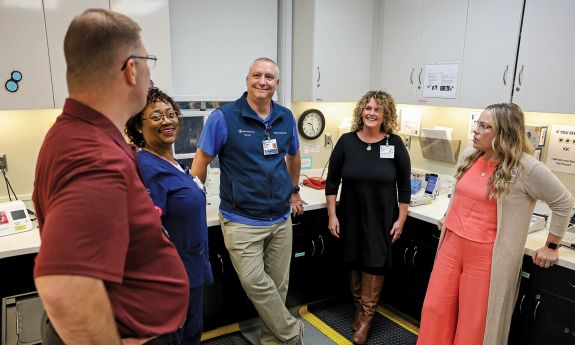How to Bounce Back from Tough Feedback
A nurse manager uses constructive feedback to build a path to professional leadership

Build Your Skills
Duke Learning & Organization Development offers courses on a range of leadership, communication and technology topics.
In a story Donohue often tells colleagues dealing with tough feedback, hearing where he fell short illuminated his path forward. To grow, Donohue sought professional development courses on communication from Duke Learning & Organization Development (L&OD) and participated in department initiatives. He watched how leaders in his unit communicated diplomatically and built strong teams through personal bonds.
When Donohue pursued the Clinical Team Lead role again in 2012, he got it.
“Feedback is a gift,” said L&OD Associate Director Joy Birmingham, who teaches courses on delivering feedback and self-leadership. “You get to choose whether you use it or not.”
Donohue’s experience provides lessons that can help you make the most of feedback.

Leave emotions behind
Tough feedback can sting, but it’s crucial to acknowledge it and not let emotions keep you from seeing potentially valuable information.
“It’s about separating facts from feelings,” Birmingham said. “We often think that feedback is about who I am as a person. It’s not. It’s about performance.”
Use input like a compass
To Donohue, the feedback received 14 years ago was one point in a longer professional journey. It showed him where he needed to grow at that time in his career to be his best self.
“Think of feedback as a tool,” Donohue said. “Sometimes it’s hard to see the tools that have been given to you. If you decide what you want, use the tools you are given to make the right changes.”
Let feedback fuel you
A Gallup study a few years ago showed that 80% of employees who received meaningful feedback felt fully engaged.
Birmingham said effective feedback is part of strong teams because it shows colleagues see potential for growth in one another.
“If people didn’t see something in you, they wouldn’t bother giving it to you,” she said. “Feedback isn’t about who you are, it’s about what you’re capable of doing.”
L&OD will offer a “Feedback Fundamentals” course on April 3 to help recognize the barriers to giving and receiving effective feedback, among other principles.
Send story ideas, shout-outs and photographs through our story idea form or write working@duke.edu.
Follow Working@Duke on X (Twitter), Facebook and Instagram and subscribe on YouTube.